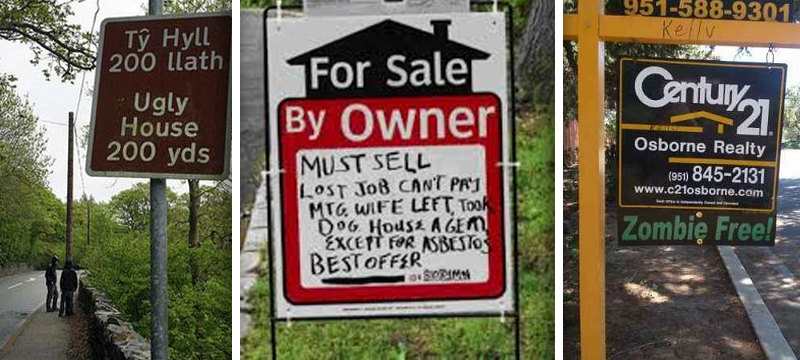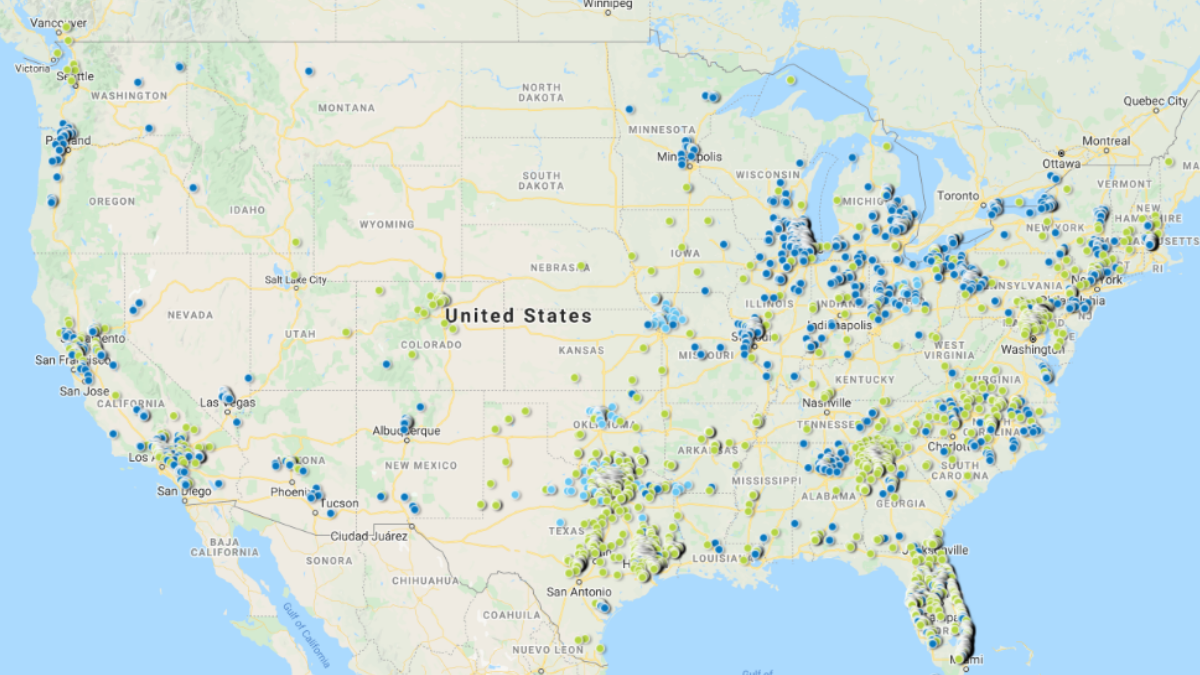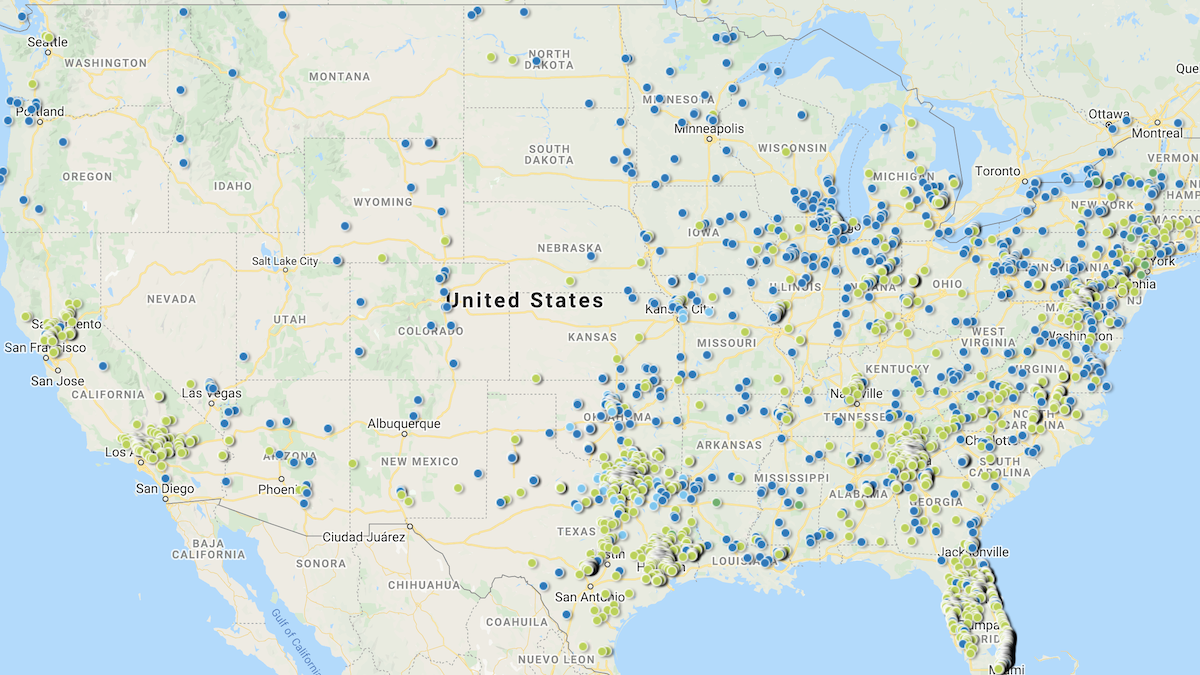Wholesale Properties Guide 101: How to Start Wholesaling Real Estate
Wholesaling is the best strategy to get into real estate investing because of its low barrier to entry. Although the idea to wholesale properties can be a little daunting (and confusing), it’s attractive because it doesn’t require a lot of upfront money from the investor.
Remember, when it comes to wholesaling, the investor is selling a contract—not the property itself. You find a deal, assume the contract, another investor (the end buyer) actually purchases the property, and you collect a finder’s fee for making the entire deal come to fruition. Sounds simple enough, right?
Let’s break down some of the basic steps to help you find and complete a wholesale deal. Let’s get started!
How do you start wholesaling real estate?
There are four main steps to wholesaling real estate:
- Contract signed between wholesaler and seller.
- Wholesaler finds outside buyer investor.
- Wholesaler assigns the contract from step one to the outside investor buyer and gets paid a non-refundable deposit from the outside investor buyer.
- Outside investor buyer closes with the seller and wholesaler gets paid the balance of his assignment fee.
The wholesaler is the man in the middle—which is why wholesaling is a great way to enter real estate IF you can find the deal and the buyer.
As a wholesaler, you need to contract a property cheaply enough to provide enough margin for 1) the outside investor buyer to be able to buy the property below market value and 2) your assignment fee.
In order to have enough margin for the deal to benefit both the investor buyer and you, the wholesaler, you have to buy the property pretty cheap. People don’t sell their house cheap for no reason—they are usually experiencing some kind of extenuating circumstance that motivates them to want to sell quickly, and makes them willing to sell below market value.
So, the first step to wholesaling a property is finding a seller who is motivated to sell their house quickly at a discount.
Motivated Sellers
First of all—we often hear the phrase “motivated seller” but what does that really mean? What makes someone a motivated seller?
Motivated sellers are typically motivated by two things: time and money. Here are a few reasons that may qualify individuals as motivated sellers:
- Their home is in or near foreclosure.
- There is a death in the family and family members need to get rid of a house quickly.
- There is a divorce and an individual needs to sell the house quickly.
- The seller made a bad investment and they want to cut their losses.
- They built a new house and the old one hasn’t sold yet.
- The seller is selling a vacation home.
- They need to move because of a job transfer and need to sell their old house.
- They moved already and want to sell their old house quickly.
Your Goal: Help the Seller
Motivated sellers aren’t usually on a “winning streak” and are usually facing hardship that motivates them to sell. That is why your goal is to help them.
As the wholesaler, you need to earn the seller’s trust. Many wholesalers tell the seller they are buying the house themselves, but it might be better to explain what is actually happening.
Tell them you specialize in solving problems for homeowners who need to sell quickly, and that you have the resources to help them AND the contacts to close quickly (e.g., title company and buyer).
Make sure to also tell them that you will do your best to find a buyer, but it is possible the house won’t sell. If the house doesn’t sell before the contract expires, then you may not be able to help them.
While it’s best to be honest, you also don’t want to confuse the seller. Explain enough for them to trust you and understand what is going to happen, but not so much that you’ve overshared and muddied the waters.
How to Find Deals
The best way to find wholesale deals when wholesaling real estate is to know exactly what you are looking for. Here are several ways can find properties and market yourself as a wholesaler:
- Search the classified ads (on and offline), searching for specific terms such as “needs work”, “investor special”, “owner will carry”, and “must sell”.
- Advertise your services. Place an ad that says “I buy houses for cash” with your phone number.
- Work with Realtors and real estate agents who know motivated sellers.
- Car magnets and bandit signs saying “We buy houses for cash”.
- Postcards and letters: Mail to your target area or zip code.
- Network: Connect with title companies, mortgage brokers, or other real estate investors.
- Clubs: Attend local real estate investment association meetings to network with buyers and other wholesalers.
- Online marketing: Use Facebook, LinkedIn, Instagram, or Twitter to promote your services.
- Start or join a Facebook group in your city.
Calculating Offer to Seller
Making an offer to a seller is an essential part of the deal. A seller might feel motivated, but they still have to find the offer attractive enough to accept. Two keys to having a great offer include having accurate comparables (comps) and utilizing the Maximum Allowable Offer (MAO) formula.
Pulling Comparables (Comps) for Wholesaling Real Estate
Comps are the prices paid for recently sold properties that are comparable in size, style, and location to the property you are researching. Looking at similar properties gives you an idea of what your property will be worth once the repairs are completed. Check out the 3 best ways to pull comps so that you have the most accurate offer to the seller. You can do just that at MyHouseDeals as we offer comps for any properties on, or off, our platform.
Maximum Allowable Offer (MAO) for Wholesaling Real Estate
This formula is a great framework for investors to determine how much they should offer for a distressed property. The MAO is designed to keep you from overpaying for a property. The most useful MAO includes accurate repair and ARV estimates. Of course they won’t be exact. But the more accurate your ARV and repair estimates, the more likely you won’t pay too much for a wholesale deal. Research your comps, talk to contractors, and do your due diligence. The more you practice determining estimates, the more accurate you will become.
MAO = 70% x ARV – Rehab Cost – Assignment Fee
Contract with the Seller
There are three clauses you should include in your contract that make a wholesale contract stand out.
- Assignment Clause: The assignment clause allows you to change the buyer from you to someone else. You are the middle man—so in the end, you’re not selling the property, you’re selling the contract. The best thing to do is explain to your seller that either you or one of your “funding partners” will be buying the house, and that way, your seller is in the loop. The last thing you want is for your seller to feel confused or taken advantage of.
- The Right to Show: A lot of houses with people in desperate situations are . . . not photo ready . . . to say the least. Make your seller aware that an investor may still come and look at the house. If the seller is nervous about this, make sure they understand that everyone looking at the house is used to viewing “as-is” properties. Nothing will surprise them (probably).
- The Escape Clause: Make sure to include a clause that makes it clear that the agreement is subject to finding a qualified buyer—otherwise you might end up having to buy a property you can’t get rid of.
Second step, find a buyer.
Marketing Wholesale Property Deals to Investors
Finding an Investor Buyer
Incoming buyer leads are just as important to being a successful wholesaler as having a regular stream of motivated seller leads. You can be an expert in the process of wholesaling but without buyers you aren’t making a profit. The idea is to market as many different ways as you can, but be consistent with it—and wholesaling is a numbers game. The more buyers you have, the more likely you will get a deal. Here are a few ways to enhance your marketing efforts:
- Craigslist: Investors are constantly searching for deals on Craigslist, so make sure you are posting properties for sale consistently and often. Creating one post will likely not be enough to have investors contacting you. Be sure to include a specific headline in the post, provide your contact information, and include pictures of the property. Provide a walk-through video and really show the ins and the outs of the property. Posting 20+ ads a week is a good goal. Tip: Posting on Fridays and Saturdays typically yield more responses.
- Direct Mail Campaigns: This includes sending letters to targeted individuals (investors) through the mail. The idea is that if you send these direct letters, over time, investors will become more familiar with you and eventually responsive. This is not a one-and-done strategy but rather one that should be deployed consistently. You can send postcards or yellow letters. Postcards allow you to get your message out there without the investor even opening an envelope. Yellow letters are written or typed letters on yellow paper (crazy, huh?!) that allow for a more personal touch.
- Post Signs: A common way to market a wholesale deal is posting signs for investors in and near the neighborhood. Use terms like “investor special for sale”.
- Networking Groups: Attend local real estate investing meetings to meet and connect with other investors. Be prepared to promote yourself as a wholesaler. Keep in mind that one conversation at a real estate networking event can lead to a potential deal, maybe six months later. Plant the seed with other investors so they come looking for you for their next deal.
- Post on MyHouseDeals: Another FREE option to market to investors is posting a deal on MyHouseDeals.com. Investors visit the site every day looking for their next property to buy. The best way to market to an investor is to market where investors are already hanging out! Investors are on MyHouseDeals.com, so go ahead and post your property.
- Email Blast: MyHouseDeals also promotes investor deals to targeted audience via email and social media. You could have an email containing only details about your property sent to active buyers in that specific market area. This is a great way to make your deal stand out from the crowd, especially if you are working with a tight timeline with the motivated seller. Of course, if you have your own buyer’s list, you should be emailing them each time you have a new deal under contract.
Tip: Create a small, dedicated list of buyers. After you work with a buyer, find out what he is looking for. You can look for properties and deals that are exactly what your buyers are looking for. This will keep your buyers coming back for more.
Contract with the Investor Buyer
The contract with the outside investor buyer is the assignment. This agreement just states that the outside investor buyer plans to buy the property and pay you a fee of “x” dollars as your acquisition fee.
Potential Title Issues
One reason sellers sometimes can’t sell a property easily is because of complicated title problems. One thing you can do as a wholesaler is try to find solutions to expedite their home sale.
Some of the most common title problems include:
- Title errors
- Liens and judgments
- Unresolved estate issues
- Missing heirs
- Unrecorded lien releases
The best thing you can do when working with a motivated seller is to ask questions. Prepare a list of questions that may help reveal some of these potential problems ahead of time. And then once you have a contract, submit to a title company right away so you can get a start on resolving potential issues.
Tip: Using an investor-friendly title company or real estate attorney can save you from potential headaches.
Closing a Wholesale Deal
In a typical wholesale deal, the wholesaler doesn’t incur the closing costs, and you as the wholesaler are assigning a contract (on the house) to the end buyer. The end buyer is responsible for closing costs incurred when completing the purchase of the house.
That being said, everything is negotiable in a contract, including closing costs. Maybe you are running out of time to sell a property. Offering to cover the closing costs may be even to help close the deal with a potential buyer.
That’s it! The basics. We will cover more in future posts, including:
To conclude, what other questions do you have about wholesaling real estate? Make sure to comment below so we can get your questions answered! Until then, happy, and profitable, investing.







